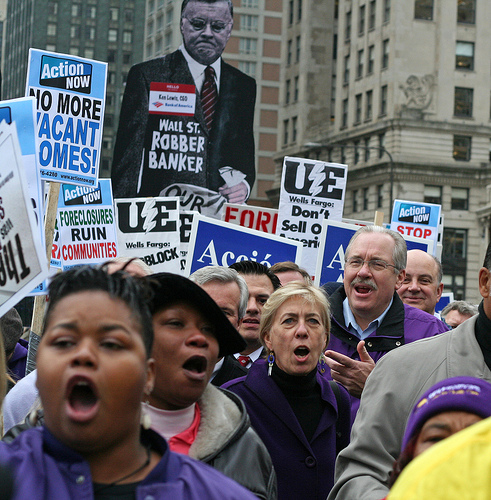
Flickr/SEIU International
Fed up with the predatory practices and utter absence of foreclosure help from Wall Street, local politicians, unions, and citizens in Los Angeles have decided to battle the big banks and financial services community themselves in LA’s own version of “Move Your Money.” While Washington stumbles its way toward financial reform, a bill in the Los Angeles city government right now would crack down on banks and lenders who hang out to dry beleaguered homeowners and would rein in unfair practices; the bill would also create a series of policies calling for the divestment of LA’s funds now held by large banks to more consumer-friendly ones. The campaign, led in part by the union SEIU, will be voted on before LA’s city council as early as next Friday, an SEIU rep says, and marks a major effort in the “Move Your Money” campaign to yank both consumers and cities’ own dollars out of bailed out institutions that aren’t helping consumers, and into smaller, often local banks or credit unions.
A representative for SEIU today sent me the latest details of LA’s “Move Your Money” bill under discussion by an LA city government committee, which recently took the following actions:
- Adopted the standards for banking relationships based on foreclosure prevention, small business lending, neighborhood banking and send to the full Council for approval;
- Called for the creation of a “report card” to evaluate the track record of banks that want to do business with the City. This report would include data on the number of small business loans provided, evidence of working with homeowners facing foreclosure, the number and location of branches and ATMs and the use of federal TARP funds. It would also allow LA policymakers the opportunity to choose banks that are giving back to the community;
- Directed the Chief Legislative Analyst to mandate a system of periodic assessment in addition to the report card to evaluate whether financial institutions meet the standards of socially responsible investing. This would include an annual, public report to the Council and Treasurer. The city would then give preference to banks in the top two deciles and lead to possible divestment for those that do not;
- Instructed the City Administrative Officer (CAO), in coordination with the Treasurer, the Chief Legislative Analyst (CLA) and the City Attorney, to enforce a moratorium on any new swap deals, and renegotiate or cancel current interest rate swap transactions at no cost to the city. The city will not do any business with banks refusing to renegotiate or cancel swaps deals. The city is currently paying $10 million each year on swaps deals and would be forced to pay $29 million to exit them;
- Requested that pension funds and proprietary departments with their own investment pools create similar policies to the ones proposed by the committee.
SEIU is also trying to introduce similar legislation in Maryland, and hopes the city-wide “Move Your Money” campaign will catch on. It’s an ambitious effort, without a doubt, and while a few hundred depositors moving their money from, say, Citigroup to Weequahic Credit Union is more symbolic than anything, convincing a half-dozen cities to do the same could have a sizeable impact.












